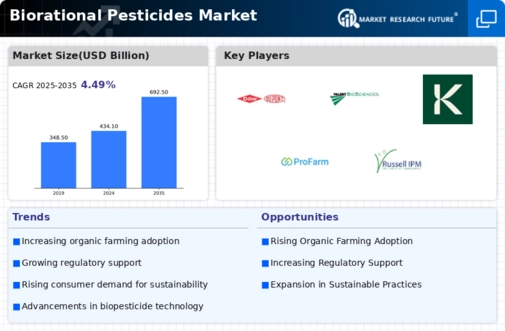Market Share
Biorational Pesticides Market Share Analysis
Biorational Pesticides Market is experiencing noteworthy trends driven by a global shift towards sustainable agricultural practices and an increasing awareness of the environmental and health impacts associated with traditional chemical pesticides. One significant trend in this market is the growing demand for biorational pesticides, which are derived from natural sources and designed to target pests selectively, minimizing harm to beneficial organisms. As consumers and farmers alike seek alternatives to conventional pesticides, biorational options are gaining popularity for their efficacy in pest control while being environmentally friendly and posing fewer risks to human health.
Integrated pest management (IPM) practices are playing a pivotal role in shaping market trends for biorational pesticides. IPM involves a holistic approach to pest control, combining cultural, biological, and chemical measures in a sustainable manner. Biorational pesticides align perfectly with this integrated approach, as they offer targeted pest control without causing harm to non-target organisms, thereby promoting a balanced and ecologically sound pest management strategy.
The emphasis on organic farming is driving market trends in the Biorational Pesticides Market. With a growing consumer preference for organic produce, farmers are seeking pesticide solutions that comply with organic certification standards. Biorational pesticides, being derived from natural substances such as botanical extracts, microbial agents, or pheromones, are gaining traction in organic agriculture as effective tools for pest management without compromising organic integrity.
Biological control methods are influencing market dynamics, with biorational pesticides playing a key role in this trend. Beneficial insects, predatory nematodes, and microbial agents are increasingly used to control pest populations naturally. Biorational pesticides complement biological control methods by providing targeted interventions to address specific pest challenges, offering a balanced and sustainable approach to pest management.
Consumer awareness and regulatory pressures are contributing to the growth of the Biorational Pesticides Market. As awareness of the environmental and health impacts of chemical pesticides grows, consumers are advocating for safer and more sustainable alternatives. Governments and regulatory bodies are responding by imposing stricter regulations on conventional pesticides, creating a conducive environment for the adoption of biorational pesticides as safer alternatives with reduced ecological impact.
The rise of specialty crops is a notable trend driving market trends in the Biorational Pesticides Market. With the increasing cultivation of high-value crops such as fruits, vegetables, and herbs, farmers are seeking pest control solutions that ensure product quality while meeting stringent market requirements. Biorational pesticides, known for their residue-free nature and compatibility with integrated pest management in specialty crops, are gaining favor among growers aiming for premium produce.
Collaborations and partnerships in the agricultural industry are contributing to market dynamics. Biorational pesticide manufacturers are collaborating with research institutions, agricultural extension services, and technology providers to develop innovative formulations and delivery systems. These partnerships accelerate the development of advanced biorational pesticides with improved efficacy and application methods, meeting the evolving needs of modern agriculture.
The Asia-Pacific region is emerging as a significant player in the Biorational Pesticides Market. Growing concerns about food safety, coupled with an increasing awareness of sustainable farming practices, are driving the demand for biorational pesticides in countries like China and India. Additionally, government initiatives supporting sustainable agriculture and organic farming practices are contributing to the market's expansion in the region.
Technological advancements in biorational pesticide formulations are influencing market trends. Manufacturers are investing in research and development to enhance the efficacy, stability, and shelf life of biorational pesticides. Advanced formulations that offer prolonged effectiveness, improved targeting of pests, and compatibility with modern farming practices are contributing to the market's competitiveness and appeal to a broader range of crops.
In conclusion, the Biorational Pesticides Market is undergoing significant changes as the agricultural sector seeks sustainable and environmentally friendly pest management solutions. With a focus on integrated pest management, organic farming, biological control methods, consumer awareness, and regulatory support, biorational pesticides are positioned as key components in the transition towards more sustainable agriculture. As the market continues to evolve, technological advancements and strategic collaborations are expected to drive further growth and innovation in the Biorational Pesticides Market.



















Leave a Comment